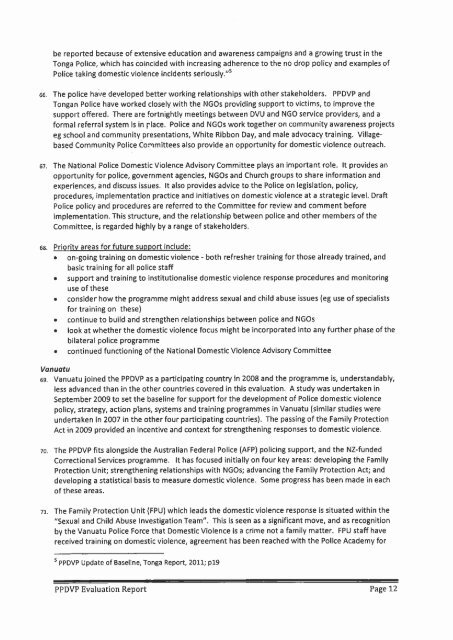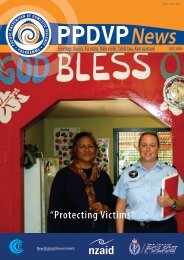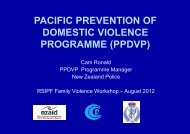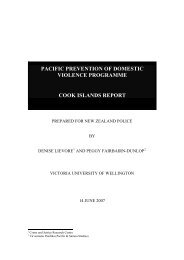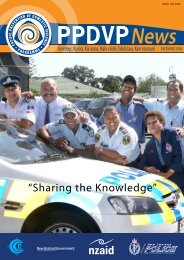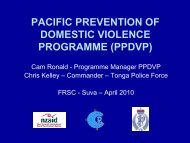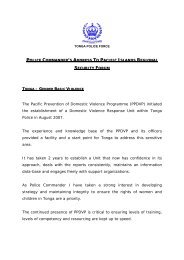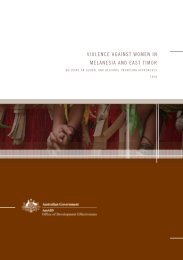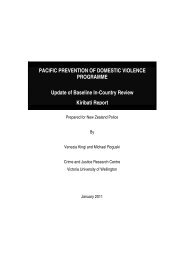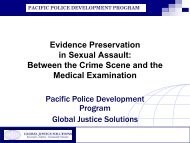PPDVP Evaluation Report - Pacific Prevention of Domestic Violence ...
PPDVP Evaluation Report - Pacific Prevention of Domestic Violence ...
PPDVP Evaluation Report - Pacific Prevention of Domestic Violence ...
You also want an ePaper? Increase the reach of your titles
YUMPU automatically turns print PDFs into web optimized ePapers that Google loves.
e reported because <strong>of</strong> extensive education and awareness campaigns and a growing trust in theTonga Police, which has coincided with increasing adherence to the no drop policy and examples <strong>of</strong>Police taking domestic violence incidents seriously."566. The police habe developed better working relationships with other stakeholders. <strong>PPDVP</strong> andTongan Police have worked closely with the NGOs providing support to victims, to improve thesupport <strong>of</strong>fered. There are fortnightly meetings between DVU and NGO service providers, and aformal referral system is in ylace. Police and NGOs work together on community awareness projectseg school and community presentations, White Ribbon Day, and male advocacy training. VillagebasedCommunity Police committees also provide an opportunity for domestic violence outreach.67. The National Police <strong>Domestic</strong> <strong>Violence</strong> Advisory Committee plays an important role. It provides anopportunity for police, government agencies, NGOs and Church groups to share information andexperiences, and discuss issues. It also provides advice to the Police on legislation, policy,procedures, implementation practice and initiatives on domestic violence at a strategic level. DraftPolice policy and procedures are referred to the Committee for review and comment beforeimplementation. This structure, and the relationship between police and other members <strong>of</strong> theCommittee, is regarded highly by a range <strong>of</strong> stakeholders.68. Prioritv areas for future support include:on-going training on domestic violence - both refresher training for those already trained, andbasic training for all police staffsupport and training to institutionalise domestic violence response procedures and monitoringuse <strong>of</strong> theseconsider how the programme might address sexual and child abuse issues (eg use <strong>of</strong> specialistsfor training on these)continue to build and strengthen relationships between police and NGOslook at whether the domestic violence focus might be incorporated into any further phase <strong>of</strong> thebilateral police programmecontinued functioning <strong>of</strong> the National <strong>Domestic</strong> <strong>Violence</strong> Advisory CommitteeVanuatu69. Vanuatu joined the <strong>PPDVP</strong> as a participating country in 2008 and the programme is, understandably,less advanced than in the other countries covered in this evaluation. A study was undertaken inSeptember 2009 to set the baseline for support for the development <strong>of</strong> Police domestic violencepolicy, strategy, action plans, systems and training programmes in Vanuatu (similar studies wereundertaken in 2007 in the other four participating countries). The passing <strong>of</strong> the Family ProtectionAct in 2009 provided an incentive and context for strengthening responses to domestic violence.70. The <strong>PPDVP</strong> fits alongside the Australian Federal Police (AFP) policing support, and the NZ-fundedCorrectional Services programme. It has focused initially on four key areas: developing the FamilyProtection Unit; strengthening relationships with NGOs; advancing the Family Protection Act; anddeveloping a statistical basis to measure domestic violence. Some progress has been made in each<strong>of</strong> these areas.71. The Family Protection Unit (FPU) which leads the domestic violence response is situated within the"Sexual and Child Abuse Investigation Team". This is seen as a significant move, and as recognitionby the Vanuatu Police Force that <strong>Domestic</strong> <strong>Violence</strong> is a crime not a family matter. FPU staff havereceived training on domestic violence, agreement has been reached with the Police Academy for<strong>PPDVP</strong> Update <strong>of</strong> Baseline, Tonga <strong>Report</strong>', 2011; p19<strong>PPDVP</strong> <strong>Evaluation</strong> <strong>Report</strong> Page 12


